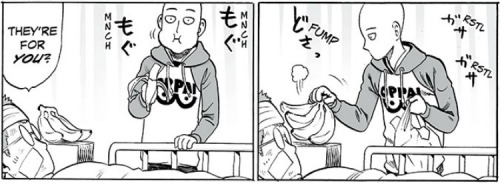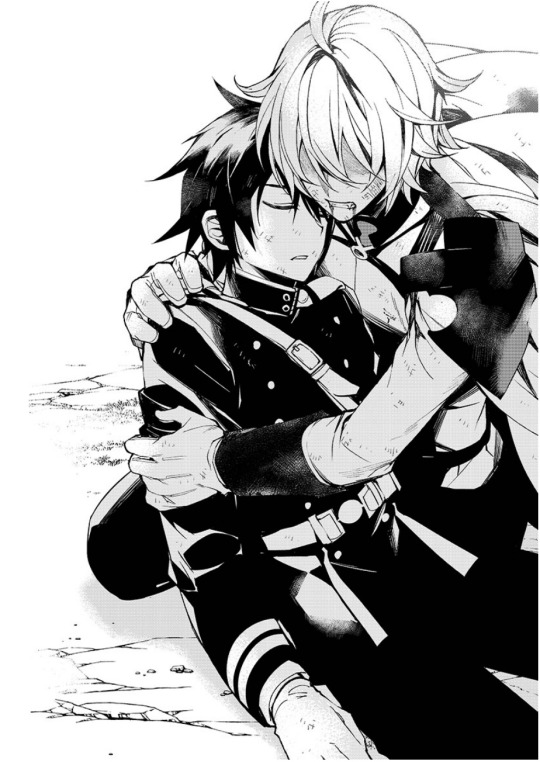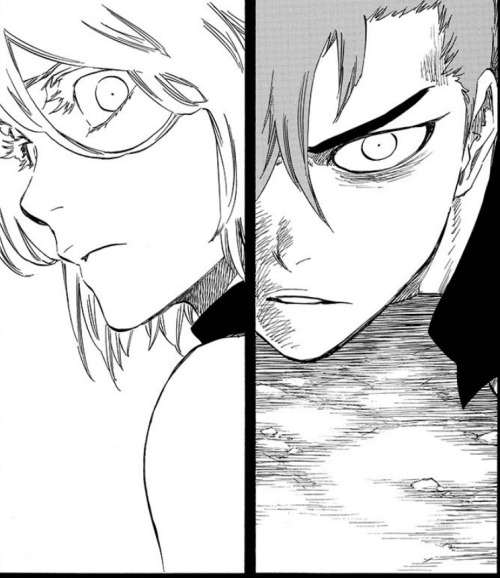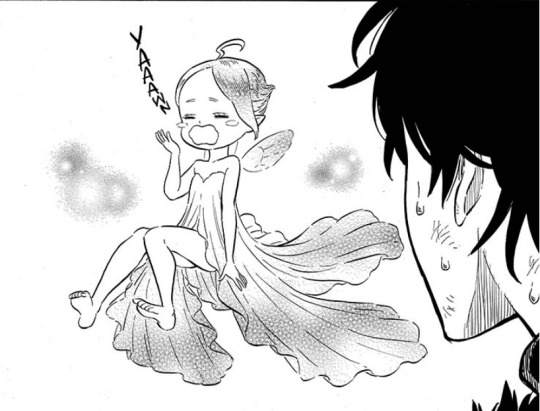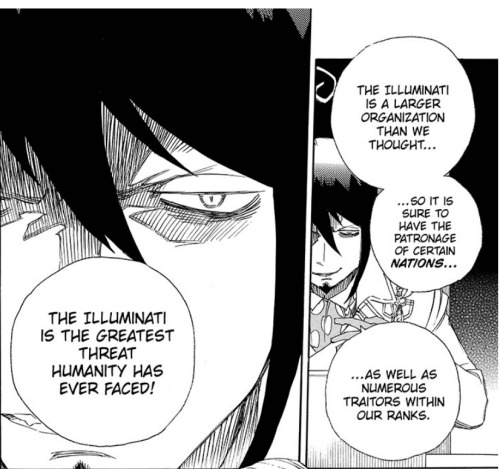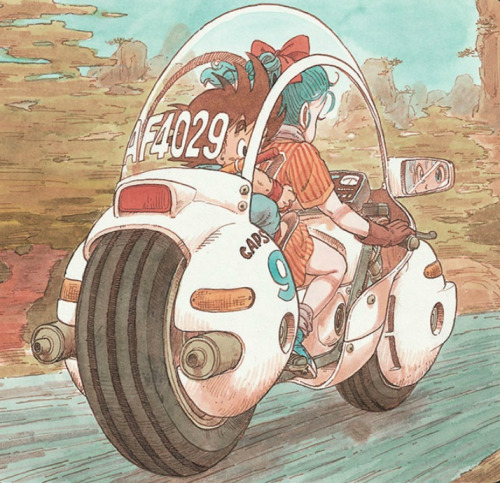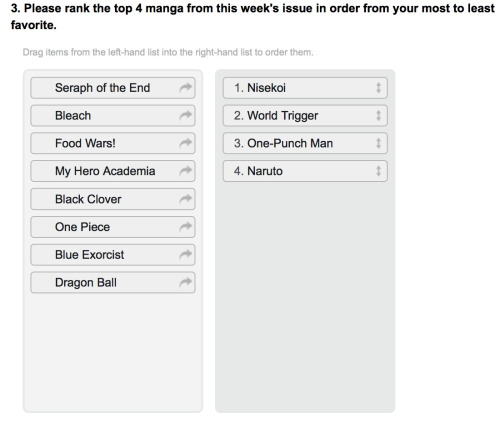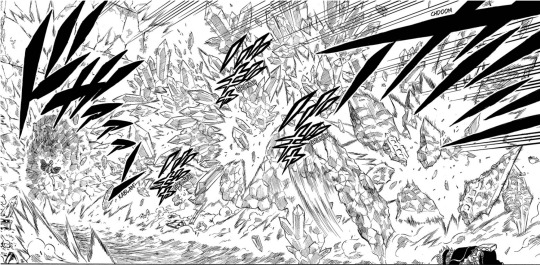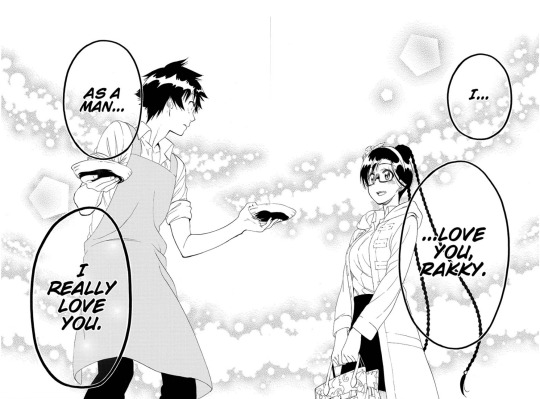07.07
I haven’t stopped I’m still doing these! I’m really sorry that I didn’t put out issue reviews these last three weeks, especially since I only just started doing them. I’m afraid that the combination of extremely long issues, more important priorities and responsibilities to my work and my family, and being overseas with no access to my Vizmanga account or decent enough internet to load a single page of manga in less than ten minutes kind of made my ability to put them out pretty low. A shame, too, since that means I missed out on commenting on some fairly pivotal chapters for a good many series, the Saint Seiya “Jump Back,” and the fantastic one-shot chapter, Foile À Deux. But now I’ve returned; renewed and ready to keep these up! So let’s get back to business. In this week of Jump, Yui grows a pair, Fujitora prostrates himself, and Bulma pees her pants. All this and more, After the Jump!
Weekly Shonen Jump: 2015, Issue No. 32
One-Punch Man chapter #47 – “Bananas”
Garo claims he’s a monster, and his actions, strength, and cruelty certainly justifies that label. But according to Mumen Rider, Garo is still a human. Obviously, he is. He was born a human being. He is human in every biological aspect. But that’s not what Mumen is taking about. Mumen believes that Garo, deep down, still has humanity. He has a conscience, he has sympathy, is capable of kindness, and every other thing a human being is capable of. Which presents an interesting social question. Would you consider murders and psychopaths like Garo still human beings, despite the horrible, unforgivable things they’ve done? Or in committing their atrocities, have they relinquished the rights they had as human beings, and purged themselves of humanity. There exist people in real life, including many a serial killer, who take gleeful joy in their sadism, with warped minds and mentality that they use to justify their crimes, to which they show no remorse to. These people are horrifying, showing no guilt for what they’ve done, or any concern for the rights and happiness of anyone besides themselves. Is that fundamentally against what a human being should be? Are those deviating from normal human behavior and social ethics fundamentally monsters by definition? Are these people, who look human, and have the same basics needs as humans, really a different sort of creature? We might draw the conclusion that a true monster cannot be defined by appearances, but rather, by his state of mind. For instance, few would disagree that Naoki Urasawa’s titular Monster was anything but, and he was, by all accounts, a friendly, handsome young man. What constitutes a monster in a human being lies not in the appearance, the personality, or even the actions of a person, but rather, the character of his very soul.
We know why Garo does what he does, and it’s not just because he likes to kill. He was angry at an injustice and inequality he saw in the treatment of so-called monsters, that good always defeated evil as a rule. So he’s made it a personal mission to correct this; to be a villain that will never fall to a hero. And as heroes so callously kill the monsters they fight, he will hunt and slaughter all the heroes in his way. He goes after strong heroes to show how powerful he is. For Garo, strength is power. And in becoming the strongest creature on earth, his cause will have to be recognized as just. Yet as cruel and ruthless as he is, Garo, by the very nature of having an agenda based on pride rather than pleasure, shows a very human mind and set of aspirations. He wants recognition. Though warped, he wants a kind of justice. He understands and has human ideals. He behaves and thinks in a human way. That’s probably what Mumen recognizes. Garo might have the strength of a beast, but he has the mind of a man. That mind can be reached out to, and it can be reasoned with. He might be a monster now, but he can change back.
The chapter gives us the idea that Garo’s strength is not purely physical, but rather, stems from his mastery of the techniques he honed under Silverfang’s tutelage. Saitama has generally fought opponents who use pure power to dominate their opponents; such as the Deep Sea King. What makes Garo more deadly than someone like, say, Boros, is the calculating precision and efficiency of his power and technique; the seamless combination of brain and brawn. That’s what has Saitama particularly intrigued. Boros was able to force Saitama to use more than one punch, but Garo, with his refined skills as a martial artist, may be the first to offer him a real challenge. This arc will likely be defined through addressing the question of Garo’s humanity, and whether he is capable of being a true monster or whether he’ll cling to his vestiges of humanity, and fall back on them. Saitama has been shown befriending many an unlikely character throughout the series through his good nature and awe-inspiring strength, and Garo respects strength, if nothing else.The inevitable confrontation between Saitama and Garo will be a clash of physical strength, but I have a feeling it will be resolved by Saitama’s strength of character instead.
Seraph of the End chapter #35 – “Traitorous Allies”
I hadn’t read a single chapter of Seraph of the End before the anime came out. And until this issue came out, I still hadn’t. While I was more optimistic about the series based on the premiere than some others, hearsay (or more specifically, the Thaumatropy commentaries) have informed me that the series is what I expected it would turn out to be; a try-hard edgy shonen that uses it’s superficial edges to mask it’s unoriginality with shock value and novelties. That said, for the purposes of this review series, I will actually catch up the series so I can criticize it properly, as I will with Blue Exorcist as well. So what did I think of this chapter of Seraph of the End?
…This was really fucking dumb. I might not know all these characters’ names or histories, but I get the central idea of what’s going on in this chapter, and it’s a case of shonen ideology not reflecting practical common sense. Mikaela may be Yu’s “family,” but he is still their enemy, does not care about the fate of human beings, and was going going to kill whoever he need to in order to reclaim Yu. This isn’t a person worth protecting, much less giving one of your most valuable soldiers to. The idea behind it is that because Yu considers him family, that makes him a part of their family. Except he doesn’t think so, and he doesn’t give a shit about whether you live or die. And it’s a really bad idea of giving one of your strongest people over to your enemy, especially when you are trying to execute a time-sensitive tactical retreat before your enemy catches up to and slaughters you. And disobeying orders, fracturing your ranks, and causing confusion and delays in a military operation just for a misguided sense of responsibility to someone you have none towards? Yeah, this is why you shouldn’t make a military where a bulk of your key officers are unbelievably idealistic teenagers who must have read many too many a shonen manga.
Mikaela was affected by their act of kindness and their “family” nonsense, so he’s probably going to ally himself with them and bail their asses out from getting slaughtered by the vampire armada next chapter. That would justify their actions in this chapter, I suppose, but if shonen cliches didn’t dictate that kind of thing has to happen, then this would be an unforgivably self-destructive mistake which would call for the dishonorable discharge of all involved. Assuming they didn’t get wiped out first, which with this team, if this series was seinen and not shonen, would seem very, very likely.
Naruto: The Seventh Hokage and the Scarlet Spring chapter #10 – “Reflected in Those Eyes”
This mini-series has been ostensibly focused on Sarada trying to understand who she is as a person before she began a new phase in her life. Defined by the insecurity she’s felt towards her abnormal family situation, she tried to define her identity as a person by understanding what kind of people her parents are, and what she means to them. Sarada was uncertain of her place in the world; whether the family she had was truly her own, and whether the ideal image she had about her parents was really true. If that ideal wasn’t reality, what would that make her, and what would the life she’s lived up until now have meant? Sarada, really, was a confused, frightened child, desperate to know that she had a family that was there for her, loved her, and would always support her, a measure of confidence she needed to finally embrace the new phase of life set before her. Sarada’s mission to find her father was ultimately a mission to understand herself.
The reality Sarada found wasn’t what she hoped for. Her father was not a warm, inviting figure like Naruto, but distant and aloof. The mother who raised her turned out not to be related to her by blood, which puts the marital status between her parents in question. Despite this heavy, life-changing news, Naruto has helped Sarada reconsider the bonds between her parents and herself. Sakura might not have been related to Sarada by blood, but she still raised her as her own, with the same care and love any mother would. So what does it matter that she didn’t give birth to her? She’s still, in every other purpose and meaning, her mother’s daughter. As for her father, she might not know him very well, and he might not be the best parental figure, but she’s accepted the fact that his blood does run in her veins, and that he does care for her and her mother. Sarada may never have the kind of family life she’s always yearned, but she’s made peace with that. There’s still a place she can call home, a place that was always her home, and there’s still a person who loves her and she loves in turn.
With this understanding, Sarada has finally stopped over thinking the imperfect aspects of her life, and has focused on what really matters to her. Her conversation with Boruto at the end of the chapter highlights how her way of thinking about her life has changed. In the first chapter of the mini-series, she expressed indifference and reluctance towards becoming a shinobi. She didn’t understand the value of the career, or what she wanted to do with her life. Her experiences finding her father, becoming closer to her parents and Naruto, and seeing them in action has helped give her people to aspire to be, and a goal to aspire for. She’s found her shinobi way; to protect the people and home she cares about. And she’s decided that the best way to do this is to become Hokage.
This entire mini-series has been about the development of Sarada as she matured from a child into an adult, as well as showing how Naruto, Sasuke, and Sakura have matured as adults and dealt with the responsibilities of parenthood. Shin and his clone children serviced just as an extreme negative parallel to their respective relationships. Much like both Naruto and Sasuke’s careless treatment of their children have alienated them towards them in some ways, so has Shin and his clone children. Like how Boruto, Sarada, and Cho Cho have shown disillusionment and rebellious behavior towards their fathers, Shin’s clones turned on him. In his example, though, his kids didn’t simply lash out or continue to silently resent him. No, the tension between them built up to the extent that they flat out try to kill Shin. Despite the extremity, it’s a reaction that was just as inevitable as Boruto painting on the Hokage faces or Sarada’s emotional breakdown; in a way, the message of this mini-series seems to be that all kids at some point will come into conflict with their parents, the consequences of which reflecting whatever influence and decisions those parents made for their kids as both examples of adulthood and authority figures. Sarada, in her volatile emotional state, might have done something just as brash as the Shin clones if Naruto didn’t substitute himself as a parental authority to guide her and remind her of what was really important. This mini-series showcases the importance of strong parental guidance and a moral influence for children, as well as stable family life that attends to a child’s needs. Otherwise, the relationships between children and their families may become fractured, and their emotional development unstable, and self-destructive.
I don’t think that the revelation that Sakura really is Sarada’s biological mother weakens any of this mini-series’ themes. For one thing, the twist, as it is, is so obvious I don’t know why anybody would complain or be surprised. You don’t really think Sasuke is enough of a ladies man to two-time two hard-headed violent broads, much less have an illegitimate child, do you? He isn’t Joseph Joestar. More to the point, Sarada’s matured and made her decision as to what she wants to be and do with her life before she learned this. It doesn’t change the strength of character arc, though I do regret it’s another example of Kishimoto’s reluctance to have his characters suffer or be “bad” people as a result of their own moral failings, rather than outside influences. It’s a weakness to his writing he really needs to fix whenever he finally makes his next long-running manga. It does also strike me as both creepy and contrived that Karin just happens to keep Sakura’s umbilical cord in her desk. Who does that? Why would you do that? There’s no logical reason, so it serves as just an excuse to cause a misunderstanding. And of course, one can’t forget this whole ordeal wouldn’t have happened if either Sakura or Shizune had just explained to Sarada the circumstances regarding her birth clearly, instead of being so vague and avoiding the topic. I can sort of understand that Sakura has poor communication skills and Shizune wouldn’t want to tell Sarada something that her mother wouldn’t be comfortable with her knowing, but this whole mini-series wouldn’t exist if either of them had been smart enough to assuage Sarada’s insecurities immediately instead of letting them linger. This kind of idiocy is especially compounded by the fact that the circumstances of Sarada’s birth are not a big deal at all. There’s no logical reason why they shouldn’t have told Sarada, and that weakness in the premise of the mini-series does weaken it, and I can understand why a few people wouldn’t be able to get past that to enjoy it’s good points.
Despite these problems, the core themes of this mini-series were still very well executed overall, and I was pleasantly surprised at how much I enjoyed it. And as promotion for the Boruto movie, it’s pretty brilliant. The mini-series downplayed Boruto’s presence and importance, but still showed enough of him to set up what his character is like and what will be his character arc will be. By developing Sarada’s character arc here, Kishimoto can focus specifically and efficiently on Boruto’s development in the film. What we’ve learned about him indicates that he’s in very much the same situation as Sarada was at the beginning of this mini-series; in a rebellious, disillusioned state of mind. Boruto’s dismissal of the value of the Hokage mirrors Sarada’s of shinobi at the beginning of the mini-series, and like her, this clearly stems from some heavy daddy issues he’s dealing with.
To be honest, this mini-series actually has made me really interested in watching the Boruto movie now, to see how this character arc will play out, and how the relationship between Boruto and his father might change. Yes, I know that Boruto will finally come to respect his father in the film and whatever, duh. But I don’t just care about what the destination is, but what the journey there will entail. In the final few years of the manga, any appreciation I had for Naruto the franchise was transformed into to loathing. However, I recognize good writing when I see it, and though there are flaws to it, this mini-series was well-written on the whole. I really appreciated Sarada’s character arc, as well as the themes underlying the series and how succinctly and effectively they were developed in such a short amount of time. The fact that it’s made me actually want to check out the Boruto movie, something I had absolutely no interest in when it was first announced, speaks to it’s strengths as both a stand-alone product and as an installment as part of the larger Naruto franchise.
The name Naruto has become a dirty word in recent years, but I’ve come to think that being a Naruto series doesn’t have to be synonymous with bad entertainment. Only the years will tell whether this newfound optimism of mine towards the franchise will be reflected in more genuinely good stories and series set in the Naruto universe, but I’d like to think there will. There’s many a franchise whose original series is now considered in poor respect, but has a newer iteration that is much acclaimed. The Naruto universe and characters are as flexible and suited for new stories as much as the Dragon Ball universe is, and it’d be a shame if it was wasted on mediocre products. For the time being, though, I’m happy to have just enjoyed this mini-series in spite of what it’s associated with, and hope that Kishimoto produces more work of this or higher quality as he finally moves on from this franchise and continues his career.
Nisekoi chapter #177 – “Remembering”
Out of all of Raku’s harem, Yui is perhaps the most underutilized, underdeveloped, and kind of a blank slate. Her entire character has been defined exclusively how nice and joyous she is, and the fact that she’s older than the rest of the girls and hence an “adult.” In most harem manga, that character would be simply just that – the nice, older girl. However, Komi is now challenging her character, whether she can feasibly cling to her kind, non-competitive nature if she really wants a relationship with Raku. Yui doesn’t want to endanger her friendships with the other girls, and interfere with their attempts to progress their relationships with him. But she can no longer be passive. She has to make a decision, and she has to do it now.
Both Yui and Marika don’t have much time left as far as becoming a couple with Raku goes. Yui needs to fulfill her duties as don and get married ASAP, and Marika is kinda dying. Marika, however, knows this, and perhaps because of that, has never hid her feelings for Raku and has always been the most aggressive, competitive, and active in trying to progress her relationship with him, something that only now has Raku seriously thinking of her as more as just a friend. Yui, on the other hand, hides her feelings and is content to just let things happen as they happen, and was about to even now if Marika didn’t hit her with a hard dose of reality. Yui is too afraid to do anything bold precisely because she doesn’t want to endanger the status quo. She’d rather things stay the same for as long as possible, in order to delay making an actual effort or decision of her own to win Raku’s heart and put her friendships with the other girls at risk.
It’s obvious why Marika, who also doesn’t have the luxury of time, would be so pissed off about that. Marika has dealt with her ticking clock by doing as much as possible, and as bold as possible, to get Raku to notice her. Yui’s passivity isn’t helping anyone, but just doing a disservice to herself. Rather than just being kind, Yui is really just afraid of taking a risk. She’s afraid of having her feelings rejected, and her friendships broken. She’s afraid of change, and really, of having to grow up. But, perhaps as a sign of her maturity, once she realizes this, and recognizes that she truly does love Raku as a man and not like a sibling, she does it. She crosses the point of no return. She tells Raku she loves him, not as a friend, not as a sister, but as a woman.
Assuming the beginning of the next chapter doesn’t go back on this and have her say that she’s just joking or something, this is a pretty pivotal development. As a romantic interest, Yui hasn’t done much or made much of a mark, but her influence and example will make Raku wake up and realize he has to decide who he really likes before it’s too late, and make the other girls start to be more aggressive against each other in winning his heart. Like Yui, they will need to risk their friendships and the status quo for love. There is no going back once they do, and things won’t be the same after, and they have to make peace with that. Komi has deliberately made sure plot and character development in this manga throughout the course of the year, and I have a feeling that he’s not going to suddenly revert it back to it’s episodic rom-com status anytime soon. I could be wrong of course, but I’m taking this chapter as a declaration that Nisekoi will be going places, and have a take on it’s genre that shonen rom-coms usually don’t dare to do. I’m not expecting Chitoge and Onodera to get into a cat fight or anything, but these characters are going to have their relationships with each other tested in more ways than one, and above all else, like Yui, they’re going to have to finally grow up.
Bleach chapter #633 – “Friend III”
This backstory would have been more effective if the relationship between Bazz B or Jugo had been foreshadowed and developed more consistently (or at all, really) over the course of this arc rather than in just this last month of chapters. On it’s own, it’s hardly a bad flashback, as it does establish a history between the two, develop their motivations, and show how Jugo became Ywach’s right-hand man in a succinct and clear manner. Sure, the chronology of the events presents certain contradictions with previously established information, but I’ve come to expect that kind of lack of continuity from Bleach, and I don’t really care about those small details enough to complain about it. It’s just hard to care about the events presented in this chapter because these characters are so secondary. I didn’t care about Bazz B going into the flashback, and that hasn’t changed coming out of it. Still, I do appreciate Kubo giving these characters some development and pathos so that this fight isn’t weightless. As far as Bleach goes, this is competent writing, something Bleach doesn’t generally have nowadays. I can’t say it’s good, because it doesn’t succeed in getting me invested in this fight, but it’s serves it’s purpose well and I can’t fault it for that.
World Trigger chapter #108 – “Yuzuru Ema”
Yuzuru Ema’s connection to the supposed traitor Hatohara delves further into the intrigue as to why she and Chika’s brother betrayed Border and escaped to the Neighbor world. Especially since there’s a reason presented for why she would do that not based in greed as many previously been thought. Hatohara, like Chika, is a very skilled sniper, but was reluctant to shoot people, and hence was not assigned to an away team by the top brass. No doubt that her motivations in doing what she did sprung from her desire to go to the Border world without fear of repercussions or consequences. While this is an interesting thread to be explored later on, the revelation that Hatohara is the same kind of sniper as Chika opens up a possibility that Chika can still fight on equal terms with her enemies and be effective at her job in spite of her reluctance to shoot people. That isn’t to say she shouldn’t try to overcome her weakness, especially since her next match is against Hatohara’s protege, but it does seem to indicate there’s another option and style of combat for Chika to adopt and hone going forward in the series, the nature of which I’m interested in seeing elaborated upon.
Whereas Chika will be head to head with a fellow sniper who thinks the same way as her, Yuma himself has gained a counterpart and rival in the form of Kagegura. Much like Yuma, Kagegura is an unpredictable wild card with unmeasured potential, above average combat skills, and a heightened sense of awareness. I admit that the angry-crazy character archetype is one I’m not particularly a fan of, but as a contrast to the calm and methodical Yuma, he should work very well. There isn’t too much to pick apart about his character, or the potential comparisons between the two yet, other than he might have some sort of mind-reading power as a compliment to Yuma’s truth-seeing one. Overall, this was a light setup chapter with intriguing developments, and it’s unfortunate the series will be absent yet again next week. I swear, these constant breaks are hurting the series’ narrative momentum, and unlike One Piece, it isn’t doing well enough in Jump or commercially to be unaffected by it. I really hope Ashihara becomes healthier soon. Perhaps I should contact Annaliese Christman to see about sending him a care package. I’m not a member of the Unofficial Osamu fan club for nothing, after all.
Food Wars! Shokugeki no Soma chapter #125 – “The Moon Festival”
I thought that Soma would compete against Kuga by using a sweet chinese dish to combat Kuga’s spiciness. He would lure Kuga’s customers towards him by offering them an opposite extreme; a soothing food to numb the violent, pungent taste of Kuga’s sichuan. It seems I was wrong about that. Soma’s Black Pepper Buns lure customers in with the novelty and impress them with their juiciness. It’s still a very spicy dish though. Maybe not as spicy as Kuga’s dish, and different enough in taste than it, but rather than a dish that takes advantage of what customers might want after having Kuga’s dish, it’s still directly competing in the same niche as it. That’s a big part of why Soma isn’t having a lot of success right now. Both he and Kuga are offering the same kind of meal, but Kuga has a reputation. People tend to stick with what they are familiar, what they know they will like, and what they know is good. Kuga is a respected name in the cooking world, but Soma is only barely recognized for his skills outside of Totsuki. As high quality as Soma’s food might be, it means nothing if he can’t draw people to his booth.
I know Soma has some kind of plan, but I’m not sure what. Before this chapter, I had assumed that this would play out like with the breakfast buffet competition in the Camp arc, where he met his quota by leeching off of Erina’s customers. That’s not working for him here, as we’ve seen, so he has to have something else in mind. Him moving the booth away at the end of the chapter might indicate that he plans to operate in different areas of the Culture Festival on each day, but that probably can’t be since everyone had to secure permits in order to operate in a specific area of the institute. Is he going to plan some sort of marketing stunt to boost interest in his booth? Is he going to overhaul it’s appearance, perhaps sell something else? I can’t tell where this is going at all, and that has me pretty excited for whatever’s gonna go down next week.
My Hero Academia chapter #49 – “Midoriya and Shigaraki”
It’s an odd coincidence how One-Punch Man and My Hero Academia have been dealing with similar topics and issues lately. Just a few issues ago both series had a chapter involving naming heroes in the same issue, and the chapters in this issue highlight the similarities between OPM’s Garo and MHA’s Stain. Both are fervent, psychopathic mass-murders who want to destroy the status quo and cause social upheaval. Both hate heroes and want to prove the might of villains. Both would consider themselves monsters, and gleefully purge anyone they’d consider weak or undesirable. Compared to Garo, Stain is a less interesting character to me, partially because we really don’t know why he thinks the way he does, how he came to be, and his relationships to and with other characters, all of which has already been established with Garo. Still, he’s just as intriguing conceptually, and is a greater threat than within the universe of his series than Garo really is in his. Not to mention that allying with the hand-face villain (who’s name I still can’t remember) bolsters his danger factor.
It looks like my suspicions about why Ida chose the internship he did were correct; he’s taken it upon himself to go after Stain and take him out. The foreshadowing of previous chapters indicates he’s not in a sound enough state of mind to carefully and rationally hunt him down, and something unfortunate is going to happen as a consequence. What that consequence will be is up in the air, but I have a feeling that someone is going to get hurt as a result of Ida’s crusade, and it’s not going to be Stain.
Black Clover chapter #20 – “One Instant”
This chapter is a hard one to talk about. Partly because it’s a very action heavy chapter, but mostly because I’m a bit confused on what exactly happened. Tabata surprised me by having Asta’s new power-up not succeed in taking down Mars, and giving Yuno a chance to shine by having him get a new power and finally taking Mars out. I’m just not certain of what, exactly, that power is. From the way the chapter reads, Yuno’s desire to save Asta’s life summons a fairy who stops Mars’ attack and then mind-blasts him into the wall. Okay. So what is that fairy? Who is that fairy? It seems that the writing from the scroll Yuno read earlier, which has now been transplanted into his book. Similarly, Asta’s new sword also seems to have turned into and object he can summon from his spell book as well. My question is; how did they gain these new powers? What allowed them to access them, use them, and what are the boundaries of their strengths and limitations? The way they’ve been presented in the story, they seemed to have come out of nowhere, and come across as the usual kind of asspull shonen power-up. This distracts me from the otherwise awesome imagery and action in the chapter. I hope that the series takes some time to answer these questions, and put limits on what Asta and Yuno can do, and establish exactly how both of them can and will get stronger as the series continues. This chapter was a decent conclusion to the battle with Mars on an action level, but things progressed a little too quickly with too little explained to really work for me on a story or character one, and that’s a shame.
One Piece chapter #792 – “On Hands and Knees”
We’ve begun the post-climax wrap up chapters for this arc, and so far it’s rather by the numbers and basic. I suppose Sabo burning Burgess’ ass for taunting him about Ace’s death was kind of neat. But King Riku’s refusal to take back his throne rings way too much of Gan Fall refusing to become God again in Skypeia. And that’s really all I have to say about those parts of the chapter. There isn’t anything behind them I feel is worth analysis or strikes me as interesting, so what else can I say about them? I am interested in seeing the ramifications of the world knowing about the fall of Dressrosa and Doflamingo, the scandal of Fujitora apologizing on the behalf of the government to Riku, and how the big powers will take action against the Law/Luffy alliance. So let’s hope we see that stuff soon and leave Dressroa as soon as possible. One Piece has stayed here far too long.
Blue Exorcist chapter #69 – “A High Level Conference”
Ho boy, I’m going to have to catch up on this series in order to talk about it, because I don’t get the context for anything talked about in this chapter. I get the jist of affairs. Basically the Illuminati are trying to open the gate to the underworld to let a bunch of demons out like in the Chapter Black arc of Yu Yu Hakusho. Also, the head brass of the Knights of the True Cross want to find who I assume was a former antagonist and have him help them in their research on the Illuminati’s zombie soldiers. Shaggy hair guy wants to be assigned to the japanese branch in order to get closer to uncovering the secret of the Illuminati and keep watch over Mephisto. Yukio is being a broody bitch and wants to become stronger to protect his older brother and whatever. I can’t analyze or really understand the weight and importance of any of this because I haven’t read more than the first few chapters of the series. I’m committed to doing full issue reviews, so I want to talk about every series in the issue, and I guess the only way to really do that for this and Seraph of the End is to catch up on them. I’ll see if I can do that by next month.
Dragon Ball chapter #1 – “Bloomers and the Monkey King”
Ha, I totally called that Jump would do Dragon Ball as it’s next Jump Back to coincide with the release of Super and the U.S. theatrical release of The Resurrection of ‘F’. Reading this first chapter, you’ll see how Toriyama’s writing is still more in-line with Dr. Slump‘s style than the tone and feel Dragon Ball would adopt later on. The dialogue is more jokey, and the humor more childish and gag-based. However, the Journey to the West influence and setting is strong and gives the series a strong adventure vibe right off the bat, as well as quickly establish the feel and potential of the world. Both Goku and Bulma are rather simple characters, and feel a bit derivative of characters from Dr. Slump. Goku’s naivety and obliviousness makes him sort of a male version of Arale, and Bulma’s snark and wit makes her pretty much a more bratty Akane. Ostensibly, the series still feels like a Toriyama comedy, and though the action sequences in the chapter are well-done, they aren’t as elaborate or detailed as what Toriyama would do in the series much later. If you showed this first chapter to someone who was only aware of the Z half of the series, they probably wouldn’t believe that this is how one of the most influential, popular, and profitable anime/manga franchises began. Still, all the fun and qualities that make Dragon Ball such a great comic are still evident from this early chapter, and while I’ve reread Dragon Ball a zillion times before, I’m always up for re-visiting it again.
Final Thoughts:
I’d like to have come back on stronger material. This wasn’t a particularly strong issue. Most of the chapters felt really brief and short on content, making them a bit unsatisfying to read. There are surely more interesting things to come in subsequent chapters of these series, but you can surmise by how little I had to say for a lot of these chapters how few of this week’s offerings genuinely impressed and stuck with me.
Best Manga of the Week:
1. Nisekoi – Does it reflect positively or negatively on the issue when Nisekoi is the best series of the week? Either way, it doesn’t matter, because Nisekoi was genuinely great this week. Among all the chapters in the issue, it had the most effective character development, emotional intensity, and a pivotal, potentially status quo-changing moment for the series to close it off. It was easily the chapter I enjoyed reading the most this issue, and the chapter that had me looking the most forward to what happened in it’s series next.
2. World Trigger – Though not as dense as recent chapters, the expansion of the mystery surrounding the traitors, giving a potential motive for the actions of Hatohara, and comparing her style of combat with Chika’s and giving her a new rival in her protege, Yuzuru was all intriguing. And while his archetype isn’t one I tend to be fond of, Kagegura does have a rather memorable introduction and I like the contrasts between him and Yuma.
3. One-Punch Man – OPM chapters tend to be short and action-heavy, but this one was a rare slower chapter for the series, effectively building up a potential character arc for Garo that was really fun to think about and analyze. I wish there was just a little more content to this week’s installment, but everything we did get here made for a great read.
4. Naruto – I’d have put this higher if the ending didn’t have too many conveniences and cop-outs for my taste. But overall, I really did enjoy this Naruto mini-series, and a lot of aspects to this ending, particularly in regards to Sarada’s character arc. It was a breath of fresh air to read some good Naruto material for a change after so many years of trite shit.
Line(s) of the Week:
Goku: “Why would I want to see your dirty butt?”
Bulma: “My butt is not dirty!”
– Dragon Ball
Panel(s) of the Week:
Page(s) of the Week:
Welp, that does it for this issue. Hopefully I can get these out regularly and on time from now on. Until next week, enjoy whatever’s good in the summer anime season, throw a weeb party with your friends, and remember to reserve your tickets for The Resurrection of ‘F’ before they sell out, and I’ll see you again after the jump!

